2008 Awards for Scholarly Distinction
In 1984 the Council of the American Historical Association established the American Historical Association Award for Scholarly Distinction. Each year a nominating jury, composed of the president, president-elect, and immediate past president, recommends to the Council of the Association up to three names for the award. Nominees are senior historians of the highest distinction in the historical profession who have spent the bulk of their professional careers in the United States. Previous awards have gone to Nettie Lee Benson, Woodrow Borah, Alfred D. Chandler Jr., Thomas D. Clark, David Brion Davis, Angie Debo, Martin Duberman, Helen G. Edmonds, Elizabeth Eisenstein, Lloyd Gardner, Peter Gay, Felix Gilbert, Jack P. Greene, John Whitney Hall, Tulio Halperín-Donghi, John Higham, H. Stuart Hughes, Margaret Atwood Judson, Nikkie R. Keddie, George F. Kennan, Paul Oskar Kristeller, Gerhart B. Ladner, Gerda Lerner, Lawrence W. Levine, Wallace T. MacCaffrey, Ramsay MacMullen, Ernest R. May, Arno J. Mayer, Richard P. McCormick, August Meier, Edmund Morgan, George L. Mosse, Robert O. Paxton, John G. A. Pocock, Earl Pomeroy, H. Leon Prather Sr., Benjamin Quarles, Edwin O. Reischauer, Robert V. Remini, Nicholas V. Riasanovsky, Caroline Robbins, Arthur M. Schlesinger Jr., Carl E. Schorske, Anne Firor Scott, Benjamin I. Schwartz, Kenneth M. Setton, Nancy G. Siraisi, Kenneth M. Stampp, Chester G. Starr, Barbara and Stanley Stein, Fritz Stern, Lawrence Stone, Sylvia L. Thrupp Strayer, Merze Tate, Emma Lou Thornbrough, Brian Tierney, David Underdown, Eugen Weber, Gerhard Weinberg, and George R. Woolfolk.
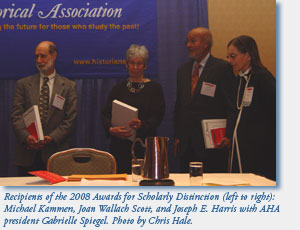 Joining this distinguished list are Michael Kammen (Cornell Univ.), Joseph E. Harris (Howard Univ.), and Joan Wallach Scott (Institute for Advanced Study, Princeton).
Joining this distinguished list are Michael Kammen (Cornell Univ.), Joseph E. Harris (Howard Univ.), and Joan Wallach Scott (Institute for Advanced Study, Princeton).
The career of Michael Kammen, Newton C. Farr Professor of American History and Culture at Cornell University, has been marked by dedicated teaching, diligent mentoring of graduate students, and especially superb scholarship. Kammen’s oeuvre seems to have been produced by three or four different historians: not just because of its enormous quantity (18 books thus far, not including ones he edited or co-authored), but also its enormous diversity.
Kammen received his PhD from Harvard University in 1964, and soon started teaching at Cornell University. He began his career as an American “colonialist” with an emphasis on politics, studying such topics as colonial agents in Britain, the origins of representative government, the politics of mercantilism, the sources of American national character, and early New York. Soon, however, he branched out in two different ways. Chronologically, he gradually maneuvered toward the present, publishing books on the Revolution and the Constitution, then marching on to the 19th and 20th centuries. Topically, he continued to study politics but devoted most of his attention to culture, with books on art, cultural criticism, and, most frequently, historical memory. It seemed that after finishing each book, he moved on to a totally new subject; as one of his Cornell colleagues said of him recently, “he never uses the same note card twice.”
Kammen’s works have all been sufficiently erudite and imaginative to nudge forward the scholarship in their respective fields. His People of Paradox: An Inquiry Concerning the Origins of American Civilization won the Pulitzer Prize in 1973, while four other books won various prizes. Kammen also promoted historical understanding through his service in various scholarly posts, including as president of the Organization of American Historians and as a member of the Council of the American Historical Association. In all these ways, Michael Kammen has richly earned the AHA Award for Scholarly Distinction.
Joseph E. Harris served for 30 years in the Department of History at Howard University before retiring in 2003 as distinguished professor emeritus. He received his bachelor’s and master’s degrees in history from Howard University and his PhD in African history from Northwestern University in 1965.
Over the course of his long professional career, Harris authored four books, edited four other books, and published more than 75 articles and chapters in scholarly works. His seminal Global Dimensions of the African Diaspora (1982), a collection of essays that grew out of conferences he organized at Howard University in 1979 and at the University of Nairobi in 1981, is widely credited with establishing the field of African diaspora studies. His monographs on the African presence in Asia, colonial Kenya, and African American reactions to the war in Ethiopia provide interpretive windows into the vast temporal and geographical dimensions of the disaspora that he envisioned.
Harris’s international collaborations have built important networks of scholars and organizations with an interest in the African diaspora. He was founder and first president of the West African Research Association in Senegal, and he served as vice president of the International African Studies Association. From 1994 to 2004, he collaborated with the United Nations Educational, Scientific, and Cultural Organization’s “Slave Route Project.” In January 2008, Harris organized and moderated an important symposium at the National Archives on the abolition of the trans-Atlantic trade in captive Africans. He has collaborated with L. Douglas Wilder, former governor of Virginia and current mayor of Richmond, to establish a National Slavery Museum in Petersburg.
His honors include the American Historical Association’s Troyer Steele Anderson Prize (1995); a Lifetime Achievement Award, Smithsonian Institution Program in African American Culture (1999); a Distinguished Africanist Award, African Studies Association (2003); Distinguished Alumni Award, Howard University (2006); and the Carter G. Woodson Medallion for Scholarship Award, Association for the Study of African American Life and History (2007).
For over 40 years, Joseph E. Harris first pioneered and then elaborated a conceptual framework for linking the histories of African-descended peoples across the Atlantic and Indian Oceans, an accomplishment for which he richly deserves the American Historical Association’s Award of Scholarly Distinction.
Few historians have had a greater impact on the field of history, and through it, on the ways in which society understands and acts on its framing of fundamental issues like the nature of social relations between the sexes, the concepts of gender and experience, and the role of the historian in shaping our understanding of who we are and how a just society might be framed. Joan Wallach Scott, Harold F. Linder Professor of Social Science at the Institute for Advanced Study, Princeton, has achieved this through her scholarly work, through her activities in helping to re-shape the profession of history in the United States, and in particular in the promotion of the status of women, and through her intellectual and institutional leadership at places like the Pembroke Center for Teaching and Research on Women at Brown University and, currently, the Institute for Advanced Studies.
As a scholar, Joan Scott is an internationally renowned historian of modern France. She is the author of numerous books and edited collections, including The Glassworkers of Carmaux: French Craftsmen and Political Action in a Nineteenth-Century City; Women, Work, and Family (co-authored with Louise Tilly); Gender and the Politics of History; Only Paradoxes to Offer: French Feminists and the Rights of Man, and most recently, Parité! Sexual Equality and the Crisis of French Universalism; The Politics of the Veil; and The Fantasy of Feminist History: Essays.
At every turn, her work has been radically innovative, particularly in the developing fields of, first, women’s history and, subsequently, the rise of studies concerned with questions of gender, whose importance as a concept for addressing both the past and the present she helped to make persuasive. This work challenged the foundations of conventional historical practice, including the nature of historical evidence and historical experience. Drawing on a range of philosophical thought, as well as on a rethinking of her own training as a labor historian, she has contributed to the formulation of a field of critical history. Written more than 20 years ago, her now classic article, “Gender: A Useful Category of Historical Analysis,” continues to inspire innovative research on women and gender (and is the subject of a lengthy forum in the December 2008 AHR). In her latest work she has been concerned with the ways in which difference poses problems for democratic practice.
The importance of her work has been recognized by an astonishing number of awards and honors. They include the AHA’s Herbert Baxter Adams Prize for the best first book by an American author in European history for The Glassworkers of Carmaux, the AHA’s Joan Kelly Prize for Gender and the Politics of History, the Hans Sigrist Prize of the University of Bern (Switzerland) for outstanding research in the field of gender studies, and the Academic Freedom Award of the Middle East Studies Association. It seems only fitting that she receive as well the American Historical Association’s Award for Scholarly Distinction.
The Troyer Steele Anderson Prize
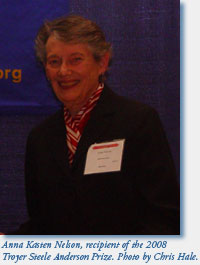 Established in 1963 through a bequest by Frank Maloy Anderson, a longtime AHA member, this prize is awarded for outstanding contributions to the advancement of the purposes of the Association. The Council selects a recipient based upon the recommendations of the Professional Division, which serves as a nominating jury in consultation with the Research and Teaching Divisions.
Established in 1963 through a bequest by Frank Maloy Anderson, a longtime AHA member, this prize is awarded for outstanding contributions to the advancement of the purposes of the Association. The Council selects a recipient based upon the recommendations of the Professional Division, which serves as a nominating jury in consultation with the Research and Teaching Divisions.
President-elect Ulrich announced that the ninth Troyer Steele Anderson Prize was awarded to Anna Kasten Nelson, distinguished historian in residence at American University, for her tireless efforts on behalf of public history within the American Historical Association and the profession. She has long served the AHA directly by her elected membership in the Research Division (1986–88) and as an appointed member of the Joint Committee of Historians and Archivists. She was interim director at the beginning of “Project ‘87,” the massive Bicentennial of the Federal Constitution initiative of the AHA and the OAH; her work established an administrative framework for the project and got it off the ground. As project director and chief investigator (author, with Committee Chair Ernest R. May, of the final report) of the Committee on the Records of Government in the mid-1980s, she addressed the issues of the effect of computers and technological change on public records and archives, a major contribution to the preservation of the records on which we now rely for research. As a member of the Kennedy Assassination Records Review Board (nominated for that role by the AHA) she not only offered public service, but also interpreted that service to the public (as she has done on many other issues) in essays published in books and journals and in frequent interviews for radio and television. She regularly is asked to testify before congressional committees on issues of access to records, the regulations governing classification and declassification, and the laws governing presidential materials. Most recently, she testified on behalf of the AHA before the congressional committee inquiring into the reclassification of documents at the National Archives.
Eugene Asher Distinguished Teaching Award
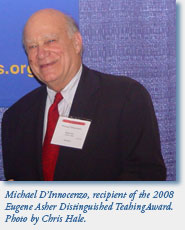 Established in 1986, the Eugene Asher Distinguished Teaching Award recognizes outstanding teaching and advocacy for history teaching at two-year, four-year, and graduate colleges and universities, by commending an inspiring teacher whose pedagogical techniques and mastery of subject matter make a lasting impression and substantial difference to students of history. The prize is named for the late Eugene Asher, who was for many years a leading advocate for history teaching. The Society for History Education (SHE) shares with the AHA sponsorship of the award. Members of the AHA and SHE submit nominations to the Committee on Teaching Prizes.
Established in 1986, the Eugene Asher Distinguished Teaching Award recognizes outstanding teaching and advocacy for history teaching at two-year, four-year, and graduate colleges and universities, by commending an inspiring teacher whose pedagogical techniques and mastery of subject matter make a lasting impression and substantial difference to students of history. The prize is named for the late Eugene Asher, who was for many years a leading advocate for history teaching. The Society for History Education (SHE) shares with the AHA sponsorship of the award. Members of the AHA and SHE submit nominations to the Committee on Teaching Prizes.
The 2008 honoree is Michael D’Innocenzo, the Harry H. Wachtel Distinguished Teaching Professor for the Study of Nonviolent Social Change at Hofstra University. For nearly a half century, Professor D’Innocenzo has inspired Hofstra students with innovative courses fostering informed civic engagement, assessing the dynamics of power and social justice, and probing issues of gender, racial, and ethnic equity. He also excels in carrying history into a broad array of public forums, so this Asher Award celebrates his commitment to connecting university and community as well as his steadfast dedication to generations of students and abiding enthusiasm for the classroom.
Beveridge Family Teaching Award
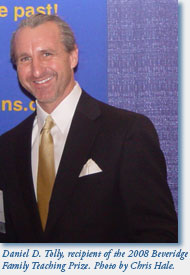 Established in 1995, this prize honors the Beveridge family’s long-standing commitment to the AHA and to K–12 teaching. Friends and family members endowed this award to recognize excellence and innovation in elementary, middle, and secondary school history teaching, including career contributions and specific initiatives. The individual can be recognized either for individual excellence in teaching or for an innovative initiative applicable to the entire field. It is offered on a two-cycle rotation: in even-numbered years, to an individual; in odd-numbered years, to a group. The prize was first offered in 1996, and in 2008 was awarded to an individual teacher.
Established in 1995, this prize honors the Beveridge family’s long-standing commitment to the AHA and to K–12 teaching. Friends and family members endowed this award to recognize excellence and innovation in elementary, middle, and secondary school history teaching, including career contributions and specific initiatives. The individual can be recognized either for individual excellence in teaching or for an innovative initiative applicable to the entire field. It is offered on a two-cycle rotation: in even-numbered years, to an individual; in odd-numbered years, to a group. The prize was first offered in 1996, and in 2008 was awarded to an individual teacher.
President-elect Ulrich announced that the 13th recipient of the Beveridge Family Teaching Prize is Daniel D. Tolly, Ann Arbor, Michigan, Public Schools. Trained in music education, Daniel Tolly employs a broad range of textual, audio, visual, and human resources to inspire and pull his K–8 students into a close, holistic study of composers and musical genres in historical time and place. Incorporating elements of theater, dance, and community outreach, Tolly’s year-long, cross-curricular projects ranging from George Gershwin to Woody Guthrie, Alton Adams, and a collective “Sweet Music of Harlem” are exemplary models of innovative pedagogy the Beveridge Award honors.
Herbert Feis Award for Distinguished Contributions to Public History
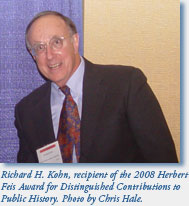 Established in 1984, this prize is offered annually to recognize distinguished contributions to public history during the previous 10 years. The prize is named in memory of Herbert Feis (1893–1972), public servant and historian of recent American foreign policy, with an initial endowment from the Rockefeller Foundation. The prize was originally given for books produced by historians working outside of academe. From 2006, the scope of the award is widened to include other types of public history work.
Established in 1984, this prize is offered annually to recognize distinguished contributions to public history during the previous 10 years. The prize is named in memory of Herbert Feis (1893–1972), public servant and historian of recent American foreign policy, with an initial endowment from the Rockefeller Foundation. The prize was originally given for books produced by historians working outside of academe. From 2006, the scope of the award is widened to include other types of public history work.
The terms of the award now define both “contribution” and “public history” broadly. Contributions could, for example, include work as the administrator of a public history group or agency (such as a historical society, a historic site, or a community history project) or as the creator or producer of a public history product or products (such as a museum exhibit, radio script, web site, oral history collection, or film). Often, the contribution will be the result of years of effort in the field, but the prize can also recognize a singular contribution of major importance such as a pathbreaking museum exhibit. Public history is defined as work primarily directed at non-academic, non-school-based audiences. Those audiences could be very broad (e.g., television viewers) or highly specialized (e.g., policymakers). Although the audience is primarily outside of academia, the recipient of the award can be employed at a university.
The 2008 prize was awarded to Richard H. Kohn, professor of history and peace, war, and defense at the University of North Carolina at Chapel Hill. Since retiring as chief historian of the U.S. Air Force in 1991, Richard Kohn has become a respected public authority and trusted adviser on U.S. civil-military relations. In his research and writing he has applied historical knowledge to some of the most troubling issues of national security, particularly addressing difficult issue of civil-military relations that can lead to problems in foreign and national security policy and military activity.
John E. O’Connor Film Award
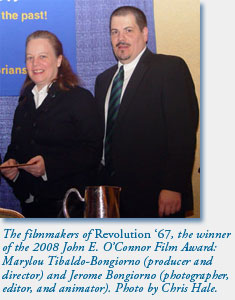 In recognition of his exceptional role as a pioneer in both teaching and research regarding film and history, the American Historical Association established this award in honor of John E. O’Connor of the New Jersey Institute of Technology. The award seeks to recognize outstanding interpretations of history through the medium of film or video. Essential elements are stimulation of thought, imaginative use of the media, effective presentation of information and ideas, sensitivity to modern scholarship, and accuracy. The production should encourage viewers to ask questions about historical interpretations as well as make a contribution to the understanding of history.
In recognition of his exceptional role as a pioneer in both teaching and research regarding film and history, the American Historical Association established this award in honor of John E. O’Connor of the New Jersey Institute of Technology. The award seeks to recognize outstanding interpretations of history through the medium of film or video. Essential elements are stimulation of thought, imaginative use of the media, effective presentation of information and ideas, sensitivity to modern scholarship, and accuracy. The production should encourage viewers to ask questions about historical interpretations as well as make a contribution to the understanding of history.
The 15th O’Connor Award was presented to Revolution ‘67, co-produced by Bongiorno Productions Inc., the Independent Television Service (ITVS), and P.O.V./American Documentary Inc., in association with WSKG, with funding provided by the Corporation for Public Broadcasting (CPB); California Newsreel, distributor; Marylou Tibaldo-Bongiorno, producer and director; Jerome Bongiorno, photographer, editor, and animator.
Revolution ‘67 is an outstanding treatment of the July 1967 riots in Newark, New Jersey, which left 26 persons dead. The film presents long-term and immediate causes of the riots, and argues that the state police and National Guard actually lengthened the period of violence. On-camera interviews with Kenneth T. Jackson and Tom Hayden are particularly impressive, as is the use of animation in showing events being discussed for which no archival footage survives.
Nancy Lyman Roelker Mentorship Award
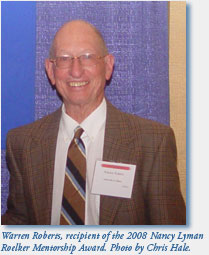 In recognition of Nancy Lyman Roelker’s role as a teacher, scholar, and committee member of the historical profession, and on the occasion of her 75th birthday, friends, colleagues, and former students established the Nancy Lyman Roelker Mentorship Award. The annual award recognizes and encourages a special quality exemplified by Professor Roelker through the human component in her teaching of history.
In recognition of Nancy Lyman Roelker’s role as a teacher, scholar, and committee member of the historical profession, and on the occasion of her 75th birthday, friends, colleagues, and former students established the Nancy Lyman Roelker Mentorship Award. The annual award recognizes and encourages a special quality exemplified by Professor Roelker through the human component in her teaching of history.
Mentoring should encompass not only a belief in the value of the study of history but also a commitment to and a love of teaching it to students regardless of age or career goals. Advising is an essential component, but it also combines a consistent personal commitment by the mentor to the student as a person. Offering a human alternative, frequently in quiet and unacknowledged ways, mentors like Professor Roelker believe that the essence of history lies in its human scope. With this award, the American Historical Association attests to the special role of mentors to the future of the historical profession.
The award is given on a three-cycle rotation to graduate, undergraduate, and secondary school teacher mentors. Nominations for the 2008 prize were for an undergraduate mentor. President-elect Ulrich announced that Warren Roberts, distinguished teaching professor at the University at Albany, State University of New York, is the recipient of the 17th annual Roelker Mentorship Award.
A distinguished historian of France, for five decades Roberts has also been an inspiring teacher and mentor to students of diverse backgrounds. Students eloquently testify to the generous and caring ways that Warren Roberts listens and provides guidance. Roberts’s close interaction with students in and out of the classroom inspires a deep love of history and learning and many of his students have gone on to share this passion through teaching, research, and public history.
Honorary Foreign Member
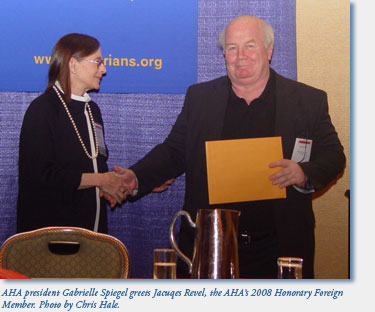 At its second annual meeting in Saratoga in 1885, the newly appointed Committee on Nominations for Honorary Membership introduced a resolution, which was adopted, that appointed Leopold von Ranke as the first honorary foreign member. Previously selected biennially, selection is now made annually, honoring a foreign scholar who is distinguished in his or her field and who has “notably aided the work of American historians.”
At its second annual meeting in Saratoga in 1885, the newly appointed Committee on Nominations for Honorary Membership introduced a resolution, which was adopted, that appointed Leopold von Ranke as the first honorary foreign member. Previously selected biennially, selection is now made annually, honoring a foreign scholar who is distinguished in his or her field and who has “notably aided the work of American historians.”
President-elect Ulrich announced the addition of Jacques Revel, directeur d’études, École des Hautes Études en Sciences Sociales, France, and read the following citation: “Professor Revel exemplifies the ongoing internationalization of the study and writing of history. His scholarly works have helped shape our understanding of early modern French history, but perhaps even more importantly, his writings on the Annales school and on recent developments in microhistory and cultural history have contributed to a truly international conversation about the direction of historical scholarship more generally. As a graduate of the prestigious École Normale Supérieure with a doctorate in history from the Sorbonne, Revel has taught at the École des Hautes Études en Sciences Sociales (Paris) since 1978. As president of the École from 1995 to 2004, he established innumerable scholarly exchanges and provided a home to hundreds of visiting scholars and students. Over the years, Revel also taught at California at Berkeley, Michigan, UCLA, NYU, Bielefeld, and numerous other universities worldwide.
“Revel’s commentary on the Annales school, and on microhistory and cultural history more generally, reflect his first-hand knowledge and collaborations with many of the leading scholars in these areas. He was co-editor of Annales, économies, sociétés, civilisation from 1975 to 1981 and remains an active member of its editorial board. His magisterial introduction to Histories: French Constructions of the Past, 1996 (with Lynn Hunt) and his book Fernand Braudel et l’histoire, 1999 provide the best available overviews of the most influential French school of history writing. His close connections to the Italian school of microhistory resulted in a series of important books explaining the methodological and especially the epistemological stakes of that approach, and he has published many books on early modern French history that have shaped ongoing research in the field. He also co-edited with A. Burguière a historiographical and methodological reflection on contemporary history, Histoire de la France, 4 vols., 1989–93. He has in addition collaborated on seven other books, ranging from the anthropology of Andean politics to weights and measures.”
2008 Book Awards
At the annual meeting, the following prizes were announced for the year 2008. The prize citations are recorded below.
Herbert Baxter Adams Prize
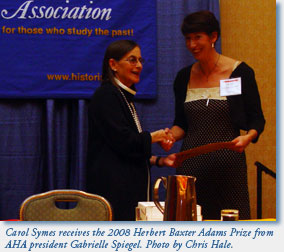 Carol Symes (Univ. of Illinois at Urbana-Champaign), for A Common Stage: Theater and Public Life in Medieval Arras (Cornell Univ. Press, 2007). In an elegantly written and theoretically sophisticated study of Europe’s earliest surviving vernacular plays, Symes illuminates the way in which theater shaped public life as well as the rich and largely unknown world of medieval Arras. Symes’ scholarship is impeccable and innovative. The book’s ability to combine theater history and urban history is truly remarkable.
Carol Symes (Univ. of Illinois at Urbana-Champaign), for A Common Stage: Theater and Public Life in Medieval Arras (Cornell Univ. Press, 2007). In an elegantly written and theoretically sophisticated study of Europe’s earliest surviving vernacular plays, Symes illuminates the way in which theater shaped public life as well as the rich and largely unknown world of medieval Arras. Symes’ scholarship is impeccable and innovative. The book’s ability to combine theater history and urban history is truly remarkable.
George Louis Beer Prize
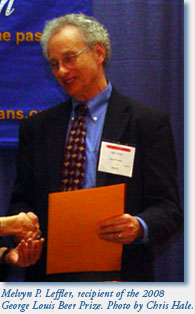 Melvyn P. Leffler (Univ. of Virginia), for For the Soul of Mankind: The United States, the Soviet Union, and the Cold War (Hill and Wang, 2007). Utilizing newly available archival sources, For the Soul offers an important new interpretation of the Cold War focused on the question of why the conflict lasted over 50 years. Structured around five diplomatic “moments” in 1945–90, it masterfully shows the way ideology, historical memory, and events interacted to shape the thoughts and actions of Soviet and U.S. leaders. Avoiding old polemics, it offers a model of judicious, thoughtful, and empirically rigorous scholarship.
Melvyn P. Leffler (Univ. of Virginia), for For the Soul of Mankind: The United States, the Soviet Union, and the Cold War (Hill and Wang, 2007). Utilizing newly available archival sources, For the Soul offers an important new interpretation of the Cold War focused on the question of why the conflict lasted over 50 years. Structured around five diplomatic “moments” in 1945–90, it masterfully shows the way ideology, historical memory, and events interacted to shape the thoughts and actions of Soviet and U.S. leaders. Avoiding old polemics, it offers a model of judicious, thoughtful, and empirically rigorous scholarship.
Albert J. Beveridge Award
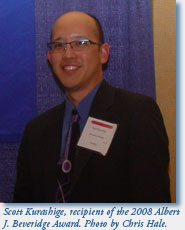 Scott Kurashige (Univ. of Michigan), for The Shifting Grounds of Race: Black and Japanese Americans in the Making of Multiethnic Los Angeles (Princeton Univ. Press, 2008). This deeply researched history of local politics and social movements looks beyond a black-white binary to compare the effects of white racism on black and Japanese communities in 20th-century Los Angeles. Fragile, multiethnic coalitions for civil rights could not overcome the continually shifting constructions of race that often put blacks and Japanese Americans in opposition to each other. An in-depth, insightful history of one American city, this book addresses issues of global significance.
Scott Kurashige (Univ. of Michigan), for The Shifting Grounds of Race: Black and Japanese Americans in the Making of Multiethnic Los Angeles (Princeton Univ. Press, 2008). This deeply researched history of local politics and social movements looks beyond a black-white binary to compare the effects of white racism on black and Japanese communities in 20th-century Los Angeles. Fragile, multiethnic coalitions for civil rights could not overcome the continually shifting constructions of race that often put blacks and Japanese Americans in opposition to each other. An in-depth, insightful history of one American city, this book addresses issues of global significance.
Paul Birdsall Prize
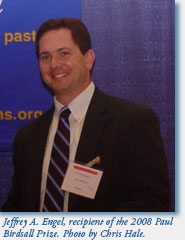 Jeffrey A. Engel (Texas A&M Univ.), for Cold War at 30,000 Feet: The Anglo-American Fight for Aviation Supremacy (Harvard Univ. Press, 2007). Jeffrey Engel presents a nuanced and excellently researched history of the British aerospace industry during the post-1945 period, which elucidates how the need for high technology exports interacted with more basic issues of Cold War diplomacy. Engel raises fundamental, new questions about the nature of the U.S.-British partnership and alliance management. He shows that there were many fissures and rivalries within this “special relationship,” which was previously believed to be the most solid of any of the Cold War alliances.
Jeffrey A. Engel (Texas A&M Univ.), for Cold War at 30,000 Feet: The Anglo-American Fight for Aviation Supremacy (Harvard Univ. Press, 2007). Jeffrey Engel presents a nuanced and excellently researched history of the British aerospace industry during the post-1945 period, which elucidates how the need for high technology exports interacted with more basic issues of Cold War diplomacy. Engel raises fundamental, new questions about the nature of the U.S.-British partnership and alliance management. He shows that there were many fissures and rivalries within this “special relationship,” which was previously believed to be the most solid of any of the Cold War alliances.
James Henry Breasted Prize
Anthony J. Barbieri-Low (Univ. of California at Santa Barbara), for Artisans in Early Imperial China (Univ. of Washington Press, 2007). Artisans in Early Imperial China explores the social, economic, and material worlds of free and enslaved, female and male artisans from the Qin through the Han dynasties (c. 221 b.c.e.–220 c.e.). There are a number of intriguing topics: literacy levels, the dangerous process of producing lacquer, and the harsh living conditions of enslaved laborers. Artisans demonstrate the surprisingly “modern” ventures of the ancient Chinese economy into the areas of marketing and mass production of goods.
John Edwin Fagg Prize
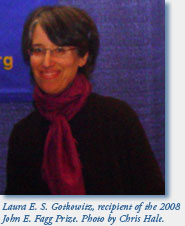 Laura Gotkowitz (Univ. of Iowa), for A Revolution for Our Rights: Indigenous Struggles for Land and Justice in Bolivia, 1880–1952 (Duke Univ. Press, 2007). A Revolution for Our Rights traces the rise of indigenous leadership before the 1952 revolution with admirable and patient attention to the complexities and confusions of peasant politics. It subtly analyzes the intersections between peasant and elite political discourses, from classical liberalism, through republicanism, through post-Chaco War corporate and mestizo populisms. Building on the recent flowering of Bolivian historiography, it adds a new perspective on early Latin American populism.
Laura Gotkowitz (Univ. of Iowa), for A Revolution for Our Rights: Indigenous Struggles for Land and Justice in Bolivia, 1880–1952 (Duke Univ. Press, 2007). A Revolution for Our Rights traces the rise of indigenous leadership before the 1952 revolution with admirable and patient attention to the complexities and confusions of peasant politics. It subtly analyzes the intersections between peasant and elite political discourses, from classical liberalism, through republicanism, through post-Chaco War corporate and mestizo populisms. Building on the recent flowering of Bolivian historiography, it adds a new perspective on early Latin American populism.
John K. Fairbank Prize in East Asian History
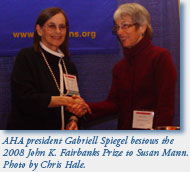 Susan Mann (Univ. of California at Davis), for The Talented Women of the Zhang Family (Univ. of California Press, 2007). Mann’s elegantly written book employs the poetry and memoirs of three generations of women in the Zhang family to transform our understanding of gender relations in 19th century China. Mann’s use of an astounding array of sources allows her to fill in the gaps left in the creative writings of the Zhang women, offering a compelling view of history through the eyes of women. Mann’s innovative historiography makes this a unique and important study.
Susan Mann (Univ. of California at Davis), for The Talented Women of the Zhang Family (Univ. of California Press, 2007). Mann’s elegantly written book employs the poetry and memoirs of three generations of women in the Zhang family to transform our understanding of gender relations in 19th century China. Mann’s use of an astounding array of sources allows her to fill in the gaps left in the creative writings of the Zhang women, offering a compelling view of history through the eyes of women. Mann’s innovative historiography makes this a unique and important study.
Morris D. Forkosch Prize
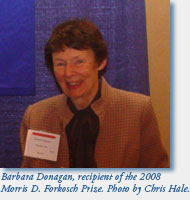 Barbara Donagan (Huntington Library), for War in England 1642–49 (Oxford Univ. Press, 2008). In her meticulously crafted study, Donagan analyzes the English Civil War’s distinctive characteristics. Most significantly, she captures the texture of war, including the means of making warfare, the codes—judicial, moral, and military—governing the conduct of war, the restraints on violence and breaking down of such restraints. She not only places England’s Civil War within the broader context of 17th-century European warfare, but also raises issues that remain pertinent to the experience of war.
Barbara Donagan (Huntington Library), for War in England 1642–49 (Oxford Univ. Press, 2008). In her meticulously crafted study, Donagan analyzes the English Civil War’s distinctive characteristics. Most significantly, she captures the texture of war, including the means of making warfare, the codes—judicial, moral, and military—governing the conduct of war, the restraints on violence and breaking down of such restraints. She not only places England’s Civil War within the broader context of 17th-century European warfare, but also raises issues that remain pertinent to the experience of war.
Leo Gershoy Award
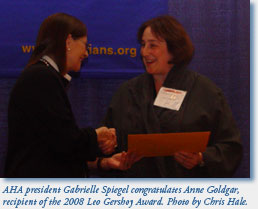 Anne Goldgar (King’s Coll. London), for Tulipmania: Money, Honor, and Knowledge in the Dutch Golden Age (Univ. of Chicago Press, 2007). This compelling revisionist study overturns everything we thought we knew about the tulip craze of 1636–37. Only a middle-class elite, not Dutch society as a whole, speculated on tulip bulbs, then rare, and suffered when prices fell. Most of the damage was social and cultural, rather than economic, involving a loss of trust and confidence, along with a generous helping of ridicule. Beautifully researched and elegantly written, this book is a page-turner, hard to set aside.
Anne Goldgar (King’s Coll. London), for Tulipmania: Money, Honor, and Knowledge in the Dutch Golden Age (Univ. of Chicago Press, 2007). This compelling revisionist study overturns everything we thought we knew about the tulip craze of 1636–37. Only a middle-class elite, not Dutch society as a whole, speculated on tulip bulbs, then rare, and suffered when prices fell. Most of the damage was social and cultural, rather than economic, involving a loss of trust and confidence, along with a generous helping of ridicule. Beautifully researched and elegantly written, this book is a page-turner, hard to set aside.
Joan Kelly Memorial Prize in Women’s History
Kathy Davis (Utrecht Univ.), for The Making of Our Bodies, Ourselves: How Feminism Travels across Borders (Duke Univ. Press, 2007). This book provides a rare combination of thought-provoking theory with serious political engagement, presented in accessible, readable prose. The book’s diverse foci include female embodiment, how historical myths function politically, race and class inequalities among feminist activists, reader response and translatability, and the complexities of global feminism. The committee believes that Kathy Davis has demonstrated that Our Bodies, Ourselves is “traveling theory par excellence,” and that the women’s history community will join us in learning from this original, important, and elegant book.
Littleton-Griswold Prize
Rebecca M. McLennan (Univ. of California at Berkeley), for The Crisis of Imprisonment: Protest, Politics, and the Making of the American Penal State, 1776–1941 (Cambridge Univ. Press, 2008). This detailed study of prisons, punishment, and convict labor fundamentally reshapes our understanding of the history of penology. Concentrating on an in-depth analysis of New York state prisons, McLennan traces the rise and fall of contract prison labor, drawing the connections between this brutal system and the larger political economic context with great theoretical sophistication.
J. Russell Major Prize
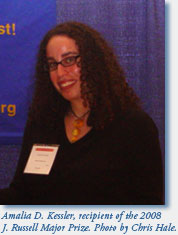 Amalia D. Kessler (Stanford Univ. Law School), for A Revolution in Commerce: The Parisian Merchant Court and the Rise of Commercial Society in Eighteenth-Century France (Yale Univ. Press, 2007). This extensively researched and compellingly argued study of the Parisian merchant courts contributes to our understanding of the pre-revolutionary transformation of law and legal practice while also shedding light on the collapse of Old Regime corporatism. Kessler traces the complex interactions between day-to-day commercial practice and the emergence of a new conception of commerce as virtuous and necessary to the public good. A Revolution in Commerce is an original and important contribution to French history.
Amalia D. Kessler (Stanford Univ. Law School), for A Revolution in Commerce: The Parisian Merchant Court and the Rise of Commercial Society in Eighteenth-Century France (Yale Univ. Press, 2007). This extensively researched and compellingly argued study of the Parisian merchant courts contributes to our understanding of the pre-revolutionary transformation of law and legal practice while also shedding light on the collapse of Old Regime corporatism. Kessler traces the complex interactions between day-to-day commercial practice and the emergence of a new conception of commerce as virtuous and necessary to the public good. A Revolution in Commerce is an original and important contribution to French history.
Helen and Howard R. Marraro Prize
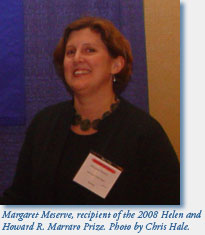 Margaret Meserve (Univ. of Notre Dame), for Empires of Islam in Renaissance Historical Thought (Harvard Univ. Press, 2008). With erudition and flair, Meserve analyzes precisely how humanists drew upon ancient ethnographies and medieval apocalyptic literature to trace the origins of the Ottoman Turks. While championing critical analysis of sources, on occasion they knowingly manipulated evidence to make it serve moral, rhetorical, and pragmatic ends. For the humanists, there was no single “Orient”: they denigrated Europe’s enemies, but also rehabilitated potential Islamic allies, as they sought to comprehend present alterity by interpreting the past.
Margaret Meserve (Univ. of Notre Dame), for Empires of Islam in Renaissance Historical Thought (Harvard Univ. Press, 2008). With erudition and flair, Meserve analyzes precisely how humanists drew upon ancient ethnographies and medieval apocalyptic literature to trace the origins of the Ottoman Turks. While championing critical analysis of sources, on occasion they knowingly manipulated evidence to make it serve moral, rhetorical, and pragmatic ends. For the humanists, there was no single “Orient”: they denigrated Europe’s enemies, but also rehabilitated potential Islamic allies, as they sought to comprehend present alterity by interpreting the past.
George L. Mosse Prize
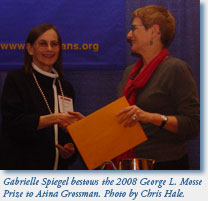 Atina Grossmann (The Cooper Union), for Jews, Germans, and Allies: Close Encounters in Occupied Germany (Princeton Univ. Press, 2007). In a powerful narrative, Grossmann tells the story of Berlin in the immediate aftermath of the Second World War. Drawing on archival sources from both sides of the Atlantic, Grossmann weaves together the postwar fate of three groups living among the ruins of Berlin: Germans, Jewish survivors, and the occupying Allied forces. The story is all the more compelling for its richness of detail concerning these difficult days. The book gracefully integrates gender, Jewish, and family history in novel ways.
Atina Grossmann (The Cooper Union), for Jews, Germans, and Allies: Close Encounters in Occupied Germany (Princeton Univ. Press, 2007). In a powerful narrative, Grossmann tells the story of Berlin in the immediate aftermath of the Second World War. Drawing on archival sources from both sides of the Atlantic, Grossmann weaves together the postwar fate of three groups living among the ruins of Berlin: Germans, Jewish survivors, and the occupying Allied forces. The story is all the more compelling for its richness of detail concerning these difficult days. The book gracefully integrates gender, Jewish, and family history in novel ways.
Premio del Rey
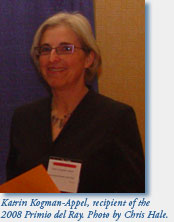 Katrin Kogman-Appel (Ben-Gurion Univ. of the Negev), for Illuminated Haggadot from Medieval Spain: Biblical Imagery and the Passover Holiday (Penn State Univ. Press, 2006). Illuminated Haggadot from Medieval Spain examines medieval Jewish figurative painting through the medium of six illuminated Haggadot produced within the realms of Iberia (including southwestern France) in the early 14th century. The author examines these prayer books in terms of their visual content, structure, uses, production, as well as the social and cultural contexts in which they were made. Handsomely illustrated and produced, the volume represents a wholly original and invaluable addition to medieval Spanish history and Jewish history, examining the role and importance of illustrated religious manuscripts as well as cultural relations between different ethno-religious groups throughout the late medieval Mediterranean world.
Katrin Kogman-Appel (Ben-Gurion Univ. of the Negev), for Illuminated Haggadot from Medieval Spain: Biblical Imagery and the Passover Holiday (Penn State Univ. Press, 2006). Illuminated Haggadot from Medieval Spain examines medieval Jewish figurative painting through the medium of six illuminated Haggadot produced within the realms of Iberia (including southwestern France) in the early 14th century. The author examines these prayer books in terms of their visual content, structure, uses, production, as well as the social and cultural contexts in which they were made. Handsomely illustrated and produced, the volume represents a wholly original and invaluable addition to medieval Spanish history and Jewish history, examining the role and importance of illustrated religious manuscripts as well as cultural relations between different ethno-religious groups throughout the late medieval Mediterranean world.
James A. Rawley Prize in Atlantic History
Marcus Rediker (Univ. of Pittsburgh), for The Slave Ship: A Human History (Viking Press, 2007). Drawing on his own research and that of a generation of scholars who have revolutionized our understanding of the Atlantic slave trade, Marcus Rediker provides the most vivid picture to date of life on the “floating dungeons” that traveled primarily between the West African coast and the east coast of the Americas. His stories of the disease, torture, and violence that marked these hellish voyages point out what profits have sometimes justified when the profit takers could comfortably remove themselves from the terror they financed.
James Harvey Robinson Prize
Historical Thinking Matters (historicalthinkingmatters.org), produced by the Center for History and New Media, George Mason University, and the School of Education, Stanford University. Historical Thinking Matters is a polished and attractive web site designed to teach students about history as it is understood by historians. Using a wide variety of materials and techniques, HTM introduces the methods used to select and interrogate documents and to weigh evidence. This web site leads students to understand that there is no one interpretation of events. It has the potential to impact the teaching of history at both the high school and college level.
Wesley-Logan Prize
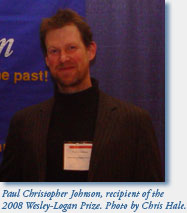 Paul Christopher Johnson (Univ. of Michigan at Ann Arbor), for Diaspora Conversions: Black Carib Religion and the Recovery of Africa (Univ. of California Press, 2007). Paul Christopher Johnson’s Diaspora Conversions is a refreshing approach to a relatively under-researched topic that combines detailed ethnographic fieldwork with critical analysis. It is a remarkable study of the history of a particular group, the Garifuna, historically known as the Black Caribs, of the Central American coast of the Caribbean. Diaspora Conversions is insightful in its explanation of the various dimensions of religious and cultural practices in the diaspora.
Paul Christopher Johnson (Univ. of Michigan at Ann Arbor), for Diaspora Conversions: Black Carib Religion and the Recovery of Africa (Univ. of California Press, 2007). Paul Christopher Johnson’s Diaspora Conversions is a refreshing approach to a relatively under-researched topic that combines detailed ethnographic fieldwork with critical analysis. It is a remarkable study of the history of a particular group, the Garifuna, historically known as the Black Caribs, of the Central American coast of the Caribbean. Diaspora Conversions is insightful in its explanation of the various dimensions of religious and cultural practices in the diaspora.
Albert Corey Prize
The Albert Corey Prize will be presented at the Canadian Historical Association’s next annual meeting scheduled for Carleton University in May 2009. The prize, sponsored jointly by the AHA and the CHA, is for the best book dealing with the history of Canadian-American relations or the history of both countries.
It is awarded to Sharon A. Roger Hepburn (Radford Univ.) for Crossing the Border: A Free Black Community in Canada (Univ. of Illinois Press, 2007). Crossing the Border is an eloquent and exhaustively researched history of the free-black planned community of Buxton, Ontario. Her richly textured story touches on the transatlantic currents of abolitionism and the transborder activism of Canadian and American emancipationists, while making a significant comparison of national racial policies. Alternating between the intimate scale of Buxton’s determined citizenry (from its founding in 1849 to today) and the wider complexities of race and slavery in U.S. and Canadian historiography, Hepburn’s compelling history offers a close look at one of the all too rare successes in fugitive black community-building in the nineteenth century.
—Sharon K. Tune is the AHA’s convention director and assistant director, administration.
Tags: Annual Meeting Annual Meeting through 2010
Comment
Please read our commenting and letters policy before submitting.






